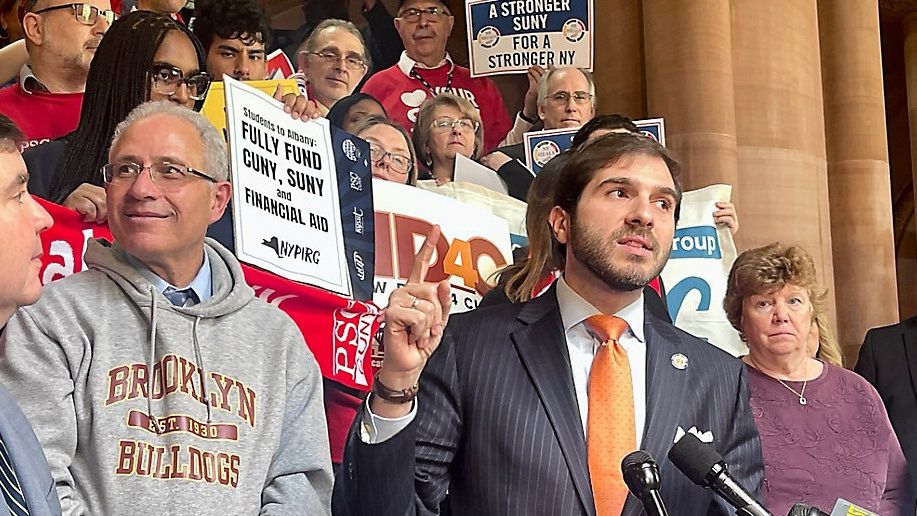Labor unions and several lawmakers are insisting the state invest billions of more dollars in the upcoming budget to support SUNY and CUNY campuses and hospitals, pushing back against the proposed tuition hikes in Gov. Kathy Hochul's proposal.
The state teacher's union, United University Professions and CUNY's union rallied with students in the Capitol on Thursday to push for at least $1.44 billion more in operating aid for SUNY and CUNY.
Their proposed New Deal for Higher Education would also invest an additional $267 million for student mental health, counseling and other programs.
Many lawmakers joined them, taking a break from hours of conferencing on the details of their one-house budgets to be released Monday.
"Like food, like shelter, like clothing, the reality is that we human beings need access to higher education in order to survive and thrive in today's economy," said Senate Labor Committee chair Jessica Ramos.
Of the governor's budget, she added, "If you're a young person working through college right now, you're staring at an executive budget not only with a tuition hike, but with a subway fare hike and no real raise in the minimum wage. It's tough. It's tough to be a young person in New York state today."
Many lawmakers spoke of their displeasure with Hochul's funding for higher education, which includes annual tuition increases tied to the Higher Education Price Index or 3% — whichever is lower — and targets funding to a select few campuses.
Many Republicans joined their progressive colleagues, standing in support of the "New Deal" for higher education in New York.
Hochul’s budget includes an increase of $270 million in support for SUNY and CUNY four-year campuses, and base support for community colleges that does not penalize two-year campuses for enrollment declines, according to the governor's office.
"New York deserves the best public higher education system and Gov. Hochul is committed to building world-class, equitable institutions," a spokesperson for Hochul said Thursday. "Gov. Hochul's plan for SUNY and CUNY includes unprecedented new financial support for these institutions, providing for the long-term future and fiscal stability for public higher education in New York, while ensuring that no student receiving a full TAP award or an Excelsior scholarship will experience additional tuition costs."
The governor's budget also proposed $856 million for SUNY and $604 million to CUNY for new capital funding, and nearly $1 billion in strategic funding for SUNY Transformation initiatives.
Members of New York State United Teachers want an additional $3 billion to make SUNY and CUNY tuition-free as campuses face historic declining enrollment.
Multiple SUNY campuses are facing a combined deficit to the tune of hundreds of millions of dollars.
SUNY Chancellor John King was positive with lawmakers about the higher education funding in the governor's budget during a hearing Feb. 27.
Officials with SUNY did not return multiple requests for comment Thursday to respond to the push for billions more dollars in support.
Students and lawmakers Thursday spoke of the economic and social benefits from public higher education.
Joshua Chan, SUNY Student Assembly's senior director of government relations, said the institutions make a huge difference for immigrant families like his.
"We need to fully fund our education system because in reality, our public education system, a public higher education system, gives us liberty," he said.
Chan said lawmakers must fully fund the SUNY and CUNY systems for resources for low-income students who suffer from hunger or cannot afford housing.
Assembly Higher Education Committee Chair Pat Fahy agrees funding needs to be higher for SUNY and CUNY to invest in emerging technology and rebuild the workforce.
She wouldn't detail how much that increase should be as the Legislature's one-house budgets take shape.
"We are trying to do everything to avoid tuition increases just because we're trying to increase the enrollments," Fahy said Thursday. "Students are struggling, whether it's transportation to get there, whether it's paying their student fees, whether it's paying for food and some of the mental health needs are very serious [and] disability needs. So all of those, we're really trying to address that because that, in the end, is what's going to turn around those enrollments."
As budget talks continue, Fahy is pushing to expand the state's Tuition Assistance Program, or TAP grant, to households making up to $110,000 annual income from its current threshold of $80,000.
Hochul also proposed a $1.5 billion endowment program for SUNY's four university research centers at Buffalo, Stony Brook, UAlbany and Binghamton, and fund where the state will provide $1 for every $2 in private donations to them.
Fahy has ideas to expand that endowment to CUNY and other SUNY campuses, but keep it fully transparent.
"We can drive millions of federal research dollars into our campuses, and in the end, that's what's going to keep us on the cutting edge," she said.


